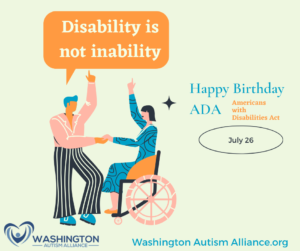34 years ago on July 26, 1990, Americans with Disabilities Act (ADA), was signed into law, which gave disabled people the right to access housing, employment, education and public spaces without discrimination and with the guarantee of reasonable accommodation. While autism was not a common diagnosis back in 1990, the rights guaranteed by the ADA benefit autistic people every day.
The ADA: Overview
There are five titles of the ADA:
- Title I: Employment
- Title II: State and Local Public Entities (and Public Transportation)
- Title III: Public Accommodations (including Commercial Facilities)
- Title IV: Telecommunications
- Title V: Miscellaneous Provisions
Title II of the ADA: Relevant Issues for Washington Autism Alliance’s Members
- Inclusion/Segregation
- Treatment and services in the most integrated setting
- Equal educational opportunities
- Applied Behavior Analysis(ABA) providers paid by insurance in the classroom
- Accessibility of services, programs, and activities
- Reasonable modifications to policies, procedures, programs for people with Intellectual developmental disabilities or mental illness
Here are some of the ways the ADA currently protects the rights of disabled people.
Protection from Employment Discrimination
The ADA states that all employers with more than 15 employees are obligated to provide reasonable accommodations to disabled employees and job applicants. The Equal Employment Opportunity Commission judges claims of employment discrimination and assigns penalties to employers found to be discriminating against disabled employees and applicants. Protection from employment discrimination is vitally important to people on the autism spectrum, as autism has one of the highest unemployment rates and underemployment rates of any disability.
Right to Reasonable Accommodation in Public Spaces
Disabled people are guaranteed the right to reasonable accommodations in places that are open to and serve the general public. This is most obvious in architectural and environmental modifications made to ensure wheelchair accessibility, but public spaces are also required to let in caregivers (paid or unpaid) and service animals that disabled people need for assistance. Many autistic people use caregivers/service providers and/or service dogs, and the ADA guarantees them the right to access the community with the service providers or service animals that they rely upon.
Protection from Housing Discrimination
The ADA made housing discrimination on the basis of disability illegal. This provision was the basis for Olmstead v. L.C., a Supreme Court case that ruled institutionalization of disabled persons to be a violation of their right to be free from housing discrimination. Thanks to Olmstead and the ADA, autistic people have the right to live in and integrate into their communities.
Protection from Discrimination in Education
The ADA, along with two other pieces of federal legislation, Section 504 and the Individuals with Disabilities Education Act (IDEA), protects disabled people from discrimination by educational institutions and mandates certain accommodations necessary for disabled persons to access appropriate educational services. Thanks to these three pieces of legislation, autistic students have the right to a free appropriate education in the least restrictive environment possible.
If you or your child have experienced discrimination due to autism and other disabilities, and need to learn more about your rights, please join WAA to access resources and services and visit the WAA Resource Directory => Directory Category ADA/Disability Rights.


